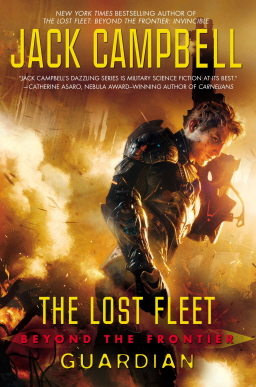For Want of a Nail… Jack Campbell on The Lost Fleet: Beyond the Frontier: Guardian
 There’s an old poem in which the lack of a nail in a horseshoe causes the loss of a battle and a kingdom. The poem is usually seen as a proverb about how small things can cause major outcomes. But it also contains an important lesson for storytellers. In SF and fantasy, we create worlds that can include anything that we want them to have. That can produce cool stories, or it can create traps that ruin stories.
There’s an old poem in which the lack of a nail in a horseshoe causes the loss of a battle and a kingdom. The poem is usually seen as a proverb about how small things can cause major outcomes. But it also contains an important lesson for storytellers. In SF and fantasy, we create worlds that can include anything that we want them to have. That can produce cool stories, or it can create traps that ruin stories.
What is any story about? A problem. Whether it is one ring that has to be destroyed or a love triangle that threatens a kingdom or an invasion by aliens who really don’t like humans, the problem drives the story. The characters have to figure out how to solve that problem, which might require a lot of walking down the yellow brick road, the occasional detour, and numerous dangers, threats and other opportunities to excel.
As characters face all of the obstacles in their path, the writer faces the trap. Because, you know, if your hero only had a nail right now, that horseshoe would stay on, the battle would be won for certain and the kingdom saved. If your spaceship only had a means to counter that alien weapon, maybe by recalibrating the frequencies on the thingamajig, then the aliens would be defeated just like that. Or if someone invents just what they need just when they need it, or someone finds a bottle with a magic genie inside, or God decides to intervene…
There’s a phrase for that trap. Deus ex machina (literally “god from the machine”). Ancient playwrights came up with the idea when they couldn’t figure out how to fix their plots.
No predicament is impossible when a god can step in. Got a dilemma that you can’t resolve? The Deus appears and fixes everything. The horseshoe has the nail. The thingamajig can destroy all of the aliens. It’s all happily-ever-after.
And readers are left feeling cheated. Where was the conflict? Where were the tough decisions? The sacrifices, the drama, the pain that we all know from real life are required to fix serious problems? The truth is that easy solutions make for bad stories.
Just as a writer creates a SF or fantasy world, it is very easy to create just the thing needed to fix everything, the thing the characters need just at that moment, the thing that will save the day. That saves the characters a lot of grief. It lets the writer bang out a happy ending in short order. And it kills the story.
If there is one firm rule I have learned about writing, it is that you can’t take the easy way out and have a good story. Mark Twain described his writing technique as “I chase my characters up a tree and throw rocks at them.”
That’s a good shorthand for the idea that as a writer you have to make things hard on your characters. (Yes, I know that’s weird. Writers create characters we like, and then we torture them for the amusement of others.)
Every time I have found a story to be stuck, I have eventually discovered that the reason was because I was being too nice to the characters. I had made things too easy on them. Once I tossed in a few nasty surprises and unfortunate events, the story got rolling again.
Which brings us back to that nail. The job of the writer isn’t to figure out how to make sure that nail stays in the horseshoe. No, the writers’ job is to make the nail fall out, and the horseshoe to be lost, and then show how the main character handles being on foot with the fate of a battle and kingdom resting on their actions. Maybe toss in a few wolves (or hostile aliens), and friends who may choose to sacrifice themselves (or otherwise meet their fates) while the hero strives to succeed anyway, achieving a final victory at the cost of much pain and sacrifice.
Those are the stories we remember. The ones where the heroes triumph despite every rock the writer can throw at them. Where the heroes win not because they were given an easy solution, but because they were smart enough, tough enough, decent enough, and brave enough to fight their way through every obstacle. Where victory comes at a sometimes bitter cost. That’s what happens in my upcoming book Guardian. The war is won and all should be well, right? No.
As Shakespeare (and Nick Lowe) said, you have to be cruel to be kind. As a writer, that is. Cruel to the characters, to be kind to the readers.
“Jack Campbell” is the pseudonym for a retired Naval officer (and graduate of the U.S. Naval Academy in Annapolis). He lives with his family in Maryland.
Excellent reminder!
[…] For Want of a Nail: Jack Campbell on The Lost Fleet: Beyond the Frontier: Guardian […]